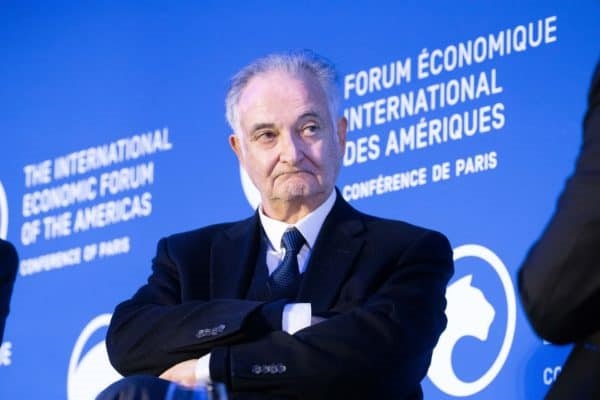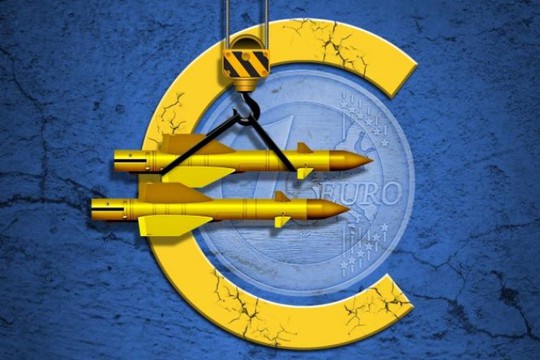Pic.: publics
This is a very revealing article at ‘Horizons’ magazine (Serbia) by Jacques Attali, a renowned French economist, social theorist, and writer. He was a Special Adviser to the French President François Mitterrand and the founder and first President of the European Bank for Reconstruction and Development. He is a man with an intimate understanding of European realities. He accurately identifies the weak points in European politics and economics.
He is right about many European problems. However, his conclusion that they can be overcome by creating a “wartime economy” in the European Union raise great doubts. He cannot even imagine the catastrophe that the next Great War would pose for Europe crossing out all hopes for the better future. This is a clear confirmation of the naivety of the current European elite, who fail to understand that the 21st century with its new weapons in case of global war would end with the destruction of Europe itself.
 Jacques Attali
Jacques Attali
Photo: ZUMA
Twenty years from now, people may say that the year 2025 was Europe’s last opportunity. It was the moment when the EU could have (had it chosen so) reclaimed its role as a central actor on the global stage — or, conversely, the year it resigned itself, through fatigue, fear, or blindness, to irrelevance. The moment it lost control over its destiny and the totality of its freedom.
Europe has all the tools to become number one in the world again, or at least to maintain its rank as number two: with over 440 million people, the EU is one of the most extensive and most integrated economic areas in the world, enabling the free movement of goods, services, capital, and people. The euro is the world’s second most widely used currency, reinforcing the EU’s monetary influence. The EU is a global trade giant, negotiating free trade agreements and setting global standards — especially in regulation, data, and sustainability.
However, the stakes are numerous, existential, and planetary: climate change, exacerbation of poverty, water shortages, and uncontrolled technologies — not to mention the specific European issues: democracy threatened, European institutions slowed down by bureaucracy, the lack of real integration, the absence of a comprehensive migration policy, and the lack of a credible common defense and security arm.
And yet, although these challenges are so existential, Europe has rarely remained so silent, its voice so hollow, its actions so lacking. At a time when the world cries out for clear leadership, for vision, for collective will, Europe hides behind rhetoric, reports without follow-up, and sterile debate. Let us examine just a few of the most telling examples.
Industrial Decline
The evidence of industrial decline is overwhelming. Prominent voices — those of former Italian Prime Ministers Mario Draghi and Enrico Letta, and others — have painted a damning portrait: the absence of European champions in key future sectors, a steady erosion of competitiveness, loss of technological sovereignty, waning innovation, fragmented markets, absurd competition rules that block continental consolidation, and a stubborn refusal to fund even dual-use military industries. There is no coherent industrial policy, collective innovation financing, and strategic vision to prevent economic subjugation. And these reports, though accurate, have led nowhere. Neither the Commission nor the Council have moved to transform their insights into concrete directives. No political will has emerged to turn diagnosis into action.
The forces of inertia — within Brussels, national governments, corporations, and bureaucracies — cling to their micro-sovereignties and narrow privileges. They prefer a patchwork of petty kingdoms to the rise of continental giants.
And yet, all is not lost. In many sectors, Europe remains the leader. In nearly every domain, the Union counts at least two companies among the global top ten. The EU possesses vast savings, world-class researchers, a great entrepreneurial spirit, and agile and inventive family businesses. All it lacks is shared political will to invest massively in the sectors of what I call the economy of life, which should be the priorities: renewable and nuclear energy, recycling, water, biodiversity, regenerative agriculture, healthy food, education, healthcare, culture, democracy, security, defense, and research. The moment has come to break with the economy of death — built on fossil fuels, pesticides, industrial food, and legalized addictions — and shift to a wartime economy, aiming not to destroy, but to rebuild.
Geopolitical Theaters
In Ukraine, European countries are diplomatically represented: the French, Germans, Poles, and Brits are visible and active. For now, they appear to have delayed the inevitable American withdrawal. But everyone knows — in Paris, Berlin, Warsaw, London, Moscow, Beijing — that such a day will come: perhaps tomorrow, in a week, or a year. Yet nothing is being done — or far too little — to ramp up the production of urgently needed weapons, either for ourselves or Ukraine: no ammunition, no drones, no advanced warfare systems. And yet, the list of needs is clear: the Ukrainians themselves are handing it to us, at the cost of their lives.
Once again, we are not in a wartime economy. We act as if the Ukraine conflict will resolve itself, as if we won’t soon face shortages of raw materials monopolized by China, of components, of strategic supplies. Even the U.S. President is beginning to realize this.
The U.S. President has openly and repeatedly expressed his desire — perfectly rational from a geopolitical standpoint — to take control of Greenland, rich in resources and strategically located along the future Northwest Passage. Meanwhile, Europe remains idle. Nothing is being done to secure this land, a Danish sovereign territory under international law, and by extension, part of the EU. There are no guarantees of this EU member state’s sovereignty. And yet, it is of vital importance to Europe for the same reason as it is to Washington.
In Africa, as the United States turns its back, China advances economically, Russia expands militarily, and ideologies and religions spread their influence, no one can deny that Africa is Europe’s natural and strategic partner. Africa is the future of Europe. It could be its most fabulous opportunity — or its gravest threat.
Working with African institutions, countries, peoples, and diasporas is the only way forward. But if we abandon the continent, catastrophe looms. In the immediate future, Africa will be home to a third of the world’s youth. Soon after, a third of the world’s total population. And if we do nothing, hundreds of millions of climate migrants will be knocking at our doors. The next migratory wave must be anticipated, managed, and co-created. Yet neither Brussels nor major European capitals seem willing to rethink our relationship with Africa, to extend a hand, or build a shared future.
In the Middle East, the EU remains a mere spectator. It announces imaginary conferences, issues weak statements, and postures at the margins — but stays absent from real negotiations. Its paralysis prevents it from sanctioning, as it should, both corrupt or terrorist Palestinian factions and the Israeli government guilty of war crimes and betrayal of the Zionist ideal. Europe is incapable of aiding the devastated population of Gaza, of contributing to the elimination of Hamas, of helping to build a Palestinian Authority that is credible, honest, and capable of governing a peaceful sovereign state alongside Israel.
Environmental Issues
If Europe wishes to remain true to what it once was, it must now dare to become what it could be: a power of the universal. Not through weapons, but through ideas. Not through domination, but through exemplarity. Not through fear, but through hope. And first of all, by becoming the vanguard of a civilization reconciled with life itself. For there is no time left to waste: the planet is suffocating, the oceans are rising, and species are collapsing. We have entered the age of runaway dynamics, where the fragile balances of the world are unraveling faster than we can comprehend them. In the face of this, Europe can no longer be content with being a regional model of ecological virtue. It must become the architect of a global pact for life, built on five essential pillars. Europe can make every trade agreement a lever for environmental progress. No more free trade without climate clauses. No more investments without guarantees for nature.
The AI Revolution
A new frontier has opened, silent and immense, made not of matter but of thought — a frontier where the machines we have created begin to think, decide, and act without us. Artificial intelligence is not coming. It is already here. And with it, the most radical upheaval humanity has ever known: a shift from the logic of tools to the logic of minds.
Europe has always had this singular vocation: to think about the world before transforming it. In the face of artificial intelligence, it is once again Europe’s task not to slow down progress, but to ensure that progress remains human. With the AI Act, the European Union is the first political entity in history to define the conditions under which artificial intelligence—even if it is not yet fully developed — can be considered acceptable. It classifies risks, sets boundaries, prohibits surveillance dystopias, and affirms that some technologies, however efficient, have no place in a democratic society. Thus, Europe sets a precedent: a civilization where machines are not above the law, and where the digital world adheres to the same moral imperatives as the physical one.
There are so many instances of silence and procrastination. How should one explain this passivity, abdication, and tragic drift? If not, it is due to the leaders’ failure to grasp the urgency of the moment. An inert Europe only strengthens populism, fuels extremism, and paves the way for its downfall.
It is not too late. We can still choose. We can still reclaim our sovereignty. We can still become a major actor in history.
An extraordinary opportunity lies before Europe. But it must find the courage to seize it.
read more in our Telegram-channel https://t.me/The_International_Affairs

 11:45 13.10.2025 •
11:45 13.10.2025 •























